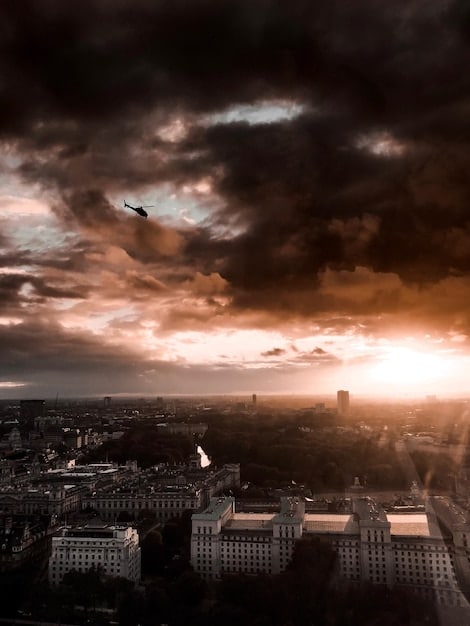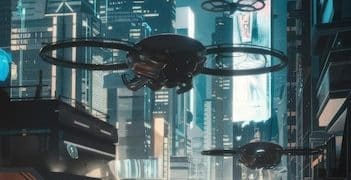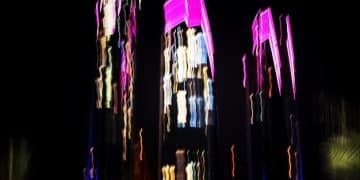Dystopian Fiction’s Relevance: Why Readers Still Care in 2025

Dystopian fiction remains relevant in 2025 because it serves as a warning against societal trends, explores the impact of technology, reflects contemporary anxieties, and offers a space for readers to contemplate social and political issues.
Dive into the unsettling yet captivating world of dystopian fiction and discover why dystopian fiction’s relevance: why dystopian novels resonate with readers in 2025 more than ever.
The Enduring Appeal of Dystopian Narratives
Dystopian fiction has always held a unique place in literature, offering readers glimpses into worlds gone wrong. These narratives, characterized by oppressive societal control, environmental devastation, and technological overreach, serve as cautionary tales, exploring the darkest potentialities of human nature and societal structures.
But why does dystopian fiction continue to resonate with readers in 2025? The answer lies in its ability to reflect our contemporary anxieties and fears, offering a safe space to explore complex social and political issues. Let’s delve into the core reasons behind the genre’s perpetual relevance.
Mirrors to Contemporary Society
Dystopian novels often subtly exaggerate existing societal trends, making readers confront uncomfortable truths about their own world. This mirroring effect is a crucial component of their enduring appeal.
Exploring “What If” Scenarios
By taking current societal problems to their extreme conclusions, dystopian fiction allows us to consider the possible consequences of inaction. This exploration can be both terrifying and enlightening.
- Climate Crisis: Dystopian narratives often depict the devastating impact of environmental collapse, prompting readers to consider the urgency of climate action.
- Technological Dependence: Many stories explore the dangers of unchecked technological advancement, raising questions about privacy, autonomy, and the nature of human connection.
- Political Polarization: Dystopian fiction frequently portrays societies deeply divided by ideology, serving as a stark warning against the dangers of extremism.
In essence, dystopian literature survives as a relevant genre because it holds a distorted mirror to our present. It compels us to actively analyze the world around us and contemplate ways to prevent these fictional nightmares from becoming reality. The genre provides not only entertainment, but also provocation to promote change.

Technology’s Double-Edged Sword
Technology is often presented as a solution to many of humanity’s problems, but dystopian fiction frequently explores its potential for misuse and abuse. This critical examination of technology is a significant reason why these novels remain relevant.
The genre allows us to consider the ethical implications of technological advancements and how they might impact our freedom, privacy, and social structures.
The Perils of Surveillance
Many dystopian narratives feature omnipresent surveillance systems used by governments or corporations to control the population. This theme resonates strongly in an age of data collection and online monitoring.
The Erosion of Human Connection
Dystopian stories often depict societies where technology has replaced genuine human interaction, leading to isolation, alienation, and a decline in empathy.
- Algorithmic Bias: Dystopian fiction can highlight how algorithms, when programmed with biases, can perpetuate inequality and discrimination, even under the guise of objective technological advancement.
- Loss of Privacy: Depictions of constant surveillance raise awareness about how much personal data is collected and tracked, and the potential for this information to be misused.
- Digital Divide: Dystopian narratives occasionally explore the consequences of unequal access to technology, creating new forms of social stratification and exclusion.
Dystopian fiction serves as a critical counterpoint to the uncritical faith in technology. By showcasing the potential pitfalls and ethical dilemmas, it promotes vigilance, caution, and responsibility when integrating new technologies into society. It fosters an informed and considered approach to the rapidly evolving impact of technology on both personal and global scales.
Reflecting Contemporary Anxieties and Fears
One of the most compelling aspects of dystopian fiction is its ability to capture and reflect the collective anxieties of a specific time period. In 2025, with the world facing complex challenges, these narratives offer a way to engage with our deepest-seated fears.
Whether it’s environmental collapse, political instability, or social unrest, dystopian novels provide a framework for exploring these concerns in a fictional setting.
A Cathartic Experience
Reading about dystopian societies can be a cathartic experience, allowing us to confront our fears in a controlled environment and imagine ways to overcome them.
A Call to Action
Dystopian fiction can also serve as a call to action, inspiring readers to become more aware of the problems facing their own society and to take steps to create positive change.
- Economic Inequality: Many dystopian narratives depict societies sharply divided by wealth, reflecting growing concerns about economic disparities and the concentration of power.
- Erosion of Democracy: Dystopian fiction often tackles the fragility of democratic institutions, portraying scenarios where freedoms are curtailed and authoritarianism rises.
- Global Pandemics: In light of recent global events, stories about pandemics and their societal consequences have gained renewed relevance, prompting readers to think about resilience and preparedness.
By tapping into collective worries, dystopian fiction helps to make these concerns more tangible and relatable. This allows readers to grapple with complicated issues in a format that is both accessible and emotionally resonant. Far from being pessimistic, these stories can empower individuals to take action, knowing that an awareness of potential issues is the first step towards creating a better future.
The Power of Social Commentary
Dystopian fiction is often used as a powerful tool for social commentary, allowing authors to critique existing power structures, challenge societal norms, and advocate for change. Its lasting relevance stems from this ability to spark critical reflection and inspire action.
By creating fictional worlds that mirror our own, these novels can expose inequalities and injustices that might otherwise go unnoticed.
Challenging Authority
Dystopian narratives frequently question authority, exposing the dangers of unchecked power and the importance of individual resistance.
Promoting Critical Thinking
By exploring complex social and political issues, dystopian fiction encourages readers to think critically about the world around them and to question the status quo.
Unlike overtly political tracts, dystopian stories weave their commentary into compelling narratives, making the message more palatable and impactful. By doing so, they reach a broader audience and encourage conversation about complex topics.

Exploring Themes of Identity and Individuality
In many dystopian societies, individuality is suppressed, and citizens are expected to conform to the dictates of the state. This suppression often leads to a struggle for identity and self-expression, a theme that resonates with readers who value individuality.
Dystopian fiction explores the importance of personal freedom and the dangers of homogenization.
The Value of Resistance
Characters who resist the oppressive forces of dystopian societies often become symbols of hope and resilience, inspiring readers to stand up for their own beliefs.
The Search for Meaning
In a world where individuality is stifled, the search for meaning and purpose becomes even more critical, leading to profound exploration of what it means to be human.
- Conformity vs. Individuality: The tension between societal expectations and personal expression is heightened in dystopian settings, forcing characters to make difficult choices about their identity.
- Loss of Freedom: These narratives often depict the psychological toll of losing personal autonomy, highlighting the importance of protecting individual liberties.
- The Power of Rebellion: Characters who challenge the status quo inspire readers to question authority and fight for their beliefs, making rebellion a central theme in these stories.
Dystopian narratives serve as potent reminders of the cost of conformity and the importance of cherishing individual perspectives. They underscore the necessity of fighting for the right to think freely and express oneself authentically, ensuring that societies do not devolve into homogenized, controlled environments. Themes of individual struggle and resistance make these stories both emotionally engaging and intellectually stimulating.
Offering Worlds to Avoid, Not to Replicate
Ultimately, the relevance of dystopian fiction lies in its ability to present compelling visions of worlds we should strive to avoid. These narratives serve as warnings, urging us to address the problems facing our own society before they lead to irreversible consequences.
By exploring the darkest potentialities of human nature and societal structures, dystopian novels offer us a chance to learn from our mistakes and build a better future.
Inspiring Hope
Although dystopian stories often paint bleak pictures of the future, they also offer a glimmer of hope, suggesting that it is always possible to resist oppression and create a more just world.
Promoting Empathy
By immersing readers in the experiences of characters living in dystopian societies, these novels can foster empathy and understanding for those who are suffering in the real world.
The survival of dystopian fiction points to a deep-seated human desire to reflect on, and learn from, the mistakes of the past and present. The genre is not about reveling in negativity, but about using imagination as a preventative measure. These imagined worlds caution about the dangers of apathy and the critical importance of proactive engagement in shaping society.
| Key Concept | Brief Description |
|---|---|
| ⚠️ Societal Warnings | Highlights potential dangers based on current trends. |
| 🤖 Tech Critique | Examines risks of unchecked technological growth. |
| 🌍 Present Anxieties | Mirrors real-world fears of readers in a fictional form. |
| ✊ Social Commentary | Critiques power, promotes reform, and challenges norms. |
Frequently Asked Questions
▼
Dystopian fiction is popular because it explores relevant societal issues and anxieties in an engaging, fictional setting. Readers find it thought-provoking and enjoy the safe space it provides to contemplate difficult questions.
▼
Common themes include oppressive governmental control, loss of individual freedom, technological misuse, environmental destruction, and social inequality. These themes reflect real-world concerns and are often exaggerated for dramatic effect.
▼
Dystopian fiction frequently mirrors current events by magnifying existing social, political, and environmental issues. This reflection helps readers to critically analyze the potential consequences of present-day trends.
▼
Yes, dystopian fiction can inspire positive change by raising awareness of societal problems and encouraging readers to take action. It prompts people to challenge authority and work towards building a better world.
▼
An effective dystopian novel is thought-provoking, emotionally resonant, and grounded in believable scenarios. It should challenge readers to consider important societal issues and inspire them to question the status quo.
Conclusion
In 2025, the ongoing relevance of dystopian fiction is unmistakable. By serving as powerful cautionary tales, exploring the potential pitfalls of technology, reflecting contemporary anxieties, and offering a platform for social commentary, these novels continue to captivate and challenge readers, reminding us to remain vigilant and proactive in shaping a more equitable and just future.





